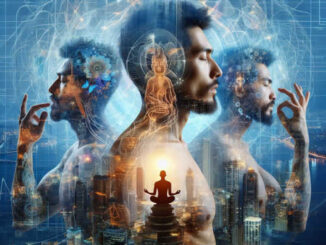
Spirituality in the Modern World: A Multifaceted Exploration
In our fast-paced, technology-driven world, spirituality remains a powerful force that shapes the lives of millions. Far from being a relic of the past, spirituality continues to evolve and adapt, offering solace, meaning, and purpose to those who seek it. This article delves into the multifaceted nature of spirituality in the modern context, exploring its various manifestations and the diverse ways in which people engage with the spiritual dimension of life.
What is Spirituality?
At its core, spirituality is the search for meaning, purpose, and connection to something greater than oneself. Unlike organized religion, which often involves specific doctrines and practices, spirituality is a more personal and flexible approach to understanding the deeper aspects of existence. It can involve belief in a higher power, but it can also manifest as a sense of interconnectedness with nature, humanity, or the universe as a whole.
Dr. Christina Puchalski, Director of the George Washington Institute for Spirituality and Health, defines spirituality as “the aspect of humanity that refers to the way individuals seek and express meaning and purpose and the way they experience their connectedness to the moment, to self, to others, to nature, and to the significant or sacred.”
Modern Perspectives
In today's world, spirituality takes on many forms, reflecting the diverse needs and experiences of individuals in a globalized society. Here are some key perspectives:
- Secular Spirituality
Many people today identify as “spiritual but not religious.” This approach emphasizes personal growth, mindfulness, and ethical living without adherence to specific religious doctrines. Secular spirituality often draws from various philosophical and psychological traditions, focusing on self-awareness, compassion, and interconnectedness.
- Interfaith and Syncretic Approaches
As our world becomes more interconnected, many individuals are exploring multiple spiritual traditions, creating personal belief systems that draw from various sources. This syncretic approach allows for a more flexible and inclusive spirituality that resonates with the multicultural experiences of many modern individuals.
- Eco-Spirituality
With growing awareness of environmental issues, many people are finding spiritual connection through nature. Eco-spirituality emphasizes the sacredness of the natural world and our responsibility to protect it. This perspective often combines elements of indigenous spiritualities, Eastern philosophies, and modern environmental ethics.
- Technological Spirituality
As technology becomes increasingly integrated into our lives, some are exploring how digital tools can enhance spiritual practice. From meditation apps to virtual reality experiences of sacred spaces, technology is opening new avenues for spiritual exploration and connection.
- Psychedelic Spirituality
There's a resurgence of interest in the spiritual potential of psychedelic substances, with research exploring their ability to induce mystical experiences and promote psychological healing. This controversial area represents a blend of ancient wisdom traditions and modern scientific inquiry.
- Social Justice as Spiritual Practice
For many, spirituality is inextricably linked to social and political engagement. This perspective sees working for justice, equality, and human rights as a form of spiritual practice, emphasizing compassion and interconnectedness in action.
The Science of Spirituality

Modern research is shedding new light on the effects of spiritual practices and experiences on the human mind and body. Neuroscientific studies have shown that meditation and prayer can alter brain structure and function, potentially leading to improvements in mental health, emotional regulation, and cognitive performance.
For example, a study published in the journal “Frontiers in Psychology” found that long-term meditation practice was associated with increased gray matter density in brain regions associated with self-awareness, compassion, and introspection.
Additionally, research in the field of psychoneuroimmunology is exploring how spiritual practices can influence the immune system and overall physical health. A meta-analysis published in the “International Journal of Psychiatry in Medicine” found that religious involvement and spirituality are associated with better health outcomes, including lower rates of cardiovascular disease, lower blood pressure, and better immune function.
In Daily Life
In the modern context, spiritual life often manifests in everyday practices and attitudes:
The popularity of mindfulness practices has exploded in recent years, with many people incorporating meditation into their daily routines. These practices, often derived from Buddhist traditions but secularized for wider appeal, help individuals cultivate present-moment awareness and emotional balance.
- Gratitude Practices
Cultivating gratitude has become a key aspect of modern spirituality. Whether through keeping a gratitude journal or practicing daily affirmations, many find that focusing on thankfulness enhances their sense of well-being and connection.
- Ethical Consumption
For many, spiritual life influences consumer choices. This might involve choosing environmentally friendly products, supporting fair trade practices, or adopting plant-based diets out of concern for animal welfare and environmental sustainability.
- Digital Detox and Sabbath Practices
In response to the constant connectivity of modern life, many are adopting practices of digital detox or secular sabbath. These intentional periods of disconnection from technology are seen as ways to reconnect with oneself, others, and the natural world.
- Body-Mind Practices
Practices like yoga, tai chi, and qigong, which integrate physical movement with spiritual principles, have gained widespread popularity. These approaches emphasize the connection between physical and spiritual well-being.
Challenges and Criticisms
While spirituality offers many benefits, it's not without its challenges and critics in the modern world:
- Commodification of Spirituality
There's concern about the commercialization of spiritual practices, with critics arguing that the “spiritual marketplace” can trivialize profound traditions and promote a superficial approach to spirituality.
- Spiritual Bypassing
This term, coined by psychologist John Welwood, refers to the tendency to use spiritual ideas and practices to avoid dealing with emotional issues or difficult life situations. It's a recognized pitfall in modern spiritual circles.
- Cultural Appropriation
As Western practitioners adopt practices from various cultures, questions of cultural appropriation and respect for traditional contexts arise. This has led to important discussions about the ethics of spiritual borrowing and the need for cultural sensitivity.
- Conflict with Scientific Worldviews
While many find ways to integrate spirituality with scientific understanding, there can be tension between spiritual beliefs and scientific explanations of reality. Navigating this interface remains a challenge for many spiritually-inclined individuals in the modern world.
The Future of Spirituality
As we look to the future, several trends are likely to shape the evolution of spirituality:
- Integration of Technology
Virtual and augmented reality may offer new ways to experience spiritual practices and sacred spaces. AI could potentially play a role in personalized spiritual guidance.
- Environmental Focus
As climate change becomes an increasingly pressing issue, spirituality that emphasizes environmental stewardship and connection to nature is likely to grow in importance.
- Interfaith Dialogue and Global Spirituality
Continued globalization may lead to more interfaith dialogue and the development of spiritual approaches that transcend traditional religious boundaries.
- Scientific Exploration
Ongoing research into the neurological and physiological effects of spiritual practices may lead to new understandings of how spirituality impacts human well-being.
- Social and Political Engagement
Spirituality may become increasingly linked with social and political activism, as people seek to align their spiritual values with their actions in the world.
Conclusion
Spiritual life in the modern world is a rich and complex phenomenon, reflecting the diverse needs, experiences, and aspirations of individuals in a rapidly changing global society. Far from being at odds with modernity, spirituality continues to evolve, offering ways for people to find meaning, connection, and purpose in the face of contemporary challenges.
Whether through traditional religious practices, secular mindfulness techniques, or innovative blends of various traditions, spirituality remains a vital force in many people's lives. It offers tools for personal growth, community building, and engaging with the profound questions of existence.
As we move forward, the landscape of spirituality will likely continue to shift and diversify. The challenge and opportunity for spiritually-oriented individuals is to navigate this rich terrain with openness, discernment, and a commitment to personal and collective well-being.
In our complex, often fragmented modern world, spirituality offers a path to wholeness, connection, and meaning. By embracing the multifaceted nature of contemporary spirituality, we can cultivate approaches that are both deeply rooted and adaptable, capable of meeting the unique challenges and opportunities of our time.
Heike Schonert
HP für Psychotherapie und Dipl.-Ök.
Heike Schonert
Heike Schonert, alternative practitioner for psychotherapy, qualified economist. As an author, journalist and designer of this magazine, she puts her whole heart and knowledge into this task.
The magazine's great success is a tireless drive to help provide this earth and all its living beings with a livable and lovable environment that serves the community and connection of all living beings.
Her motto is: “If we are honest with ourselves, understand ourselves as a whole and are filled with the desire to heal ourselves and love ourselves as we are, we will pass this love on to other people and grow with them. “





